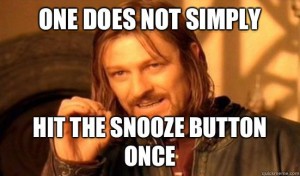By Guest Blogger, Vincent Su
If you feel that actions speak louder than words, then perhaps this quote from Aristotle will resonate with you:
“We are what we repeatedly do, Excellence, then, is not an act, but a habit”
 Think back to the last time that you thought about how you were going to get to class or where you were going to get lunch on Tuesdays. There are tons of decisions that we make on a daily basis without even thinking. Why is it hard for some people to resist hitting the snooze button, yet natural for others to get up early enough to exercise in the morning? These are all a matter of habit. If you want to begin improving yourself, there are two main categories of habits.
Think back to the last time that you thought about how you were going to get to class or where you were going to get lunch on Tuesdays. There are tons of decisions that we make on a daily basis without even thinking. Why is it hard for some people to resist hitting the snooze button, yet natural for others to get up early enough to exercise in the morning? These are all a matter of habit. If you want to begin improving yourself, there are two main categories of habits.
- Good habits you want to build
- Bad habits you want to break
Building Good Habits
So you’ve made your week 1 resolutions, and you’re ready to see how long this quarter’s streak will last, what should you know? Well, according to Charles Duhigg, author of “The Power of Habit”, our brains process habits as a single unit comprised of multiple automated actions. The key part of this discovery is that to make these neural connections last, we need two critical components surrounding the habit – a trigger and a reward.

Let’s say your goal is to start running on a daily basis. Chances are, you’ll be pretty busy with all the other things in your schedule that you’re unlikely to just go running whenever you feel like it. Instead, it will be easier to get your mind into running mode if you have some sort of cue to go running, whether it’s going right before dinner or during those awkward 30 minute periods between classes. The second element you’ll need is a
reward, something that will encourage you to repeat the action. Again for the example of running, you could get a runner’s high, or perhaps treat yourself to a little extra dessert.
Breaking Bad Habits
While it seems that breaking bad habits is harder than forging new ones, there’s more similarity between the two than you might think. In the way that creating triggers and rewards are critical to forming new habits, identifying the triggers and rewards of your bad habits is the first step to overcoming them. If you bite your nails, ask yourself why you do it. Is it because you’re bored? Are you stressed? Do you like constantly chewing? Identifying these types of questions is what will help you discover alternatives like talking with a friend, going for a walk, or maybe just carrying around a pack of gum.
Even with the most willpower in the world, habits aren’t formed overnight. If you set your alarm for two hours earlier, you will most likely oversleep the next day. But if you set it for 10 minutes earlier every day for two weeks, then you might have a better shot.
What do you wish you could change?
